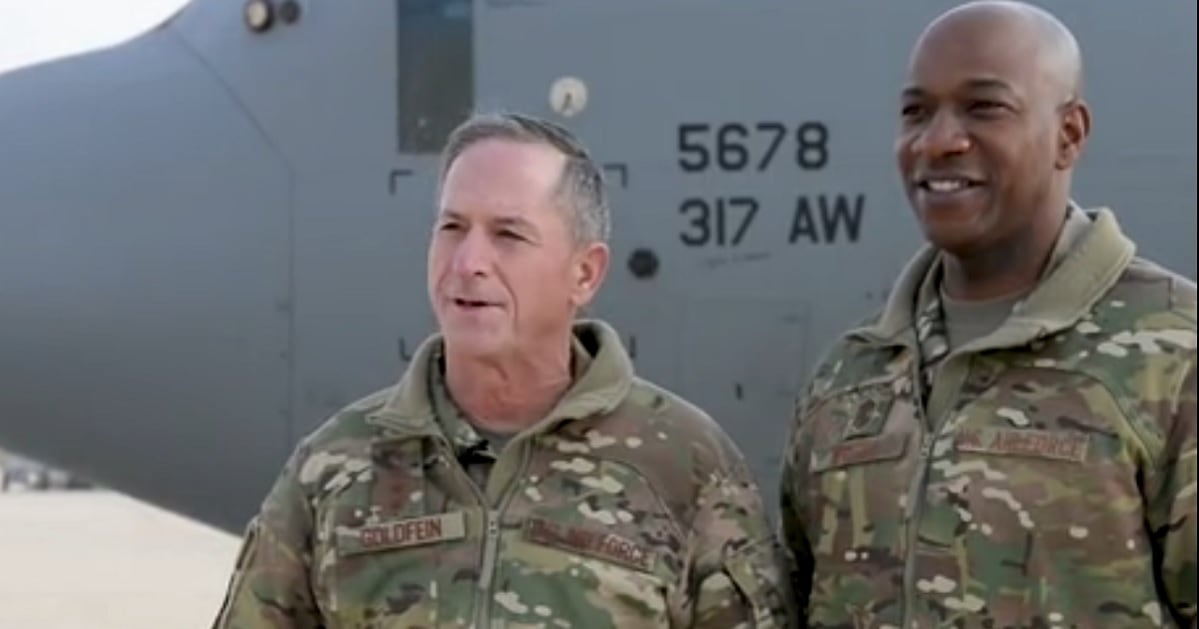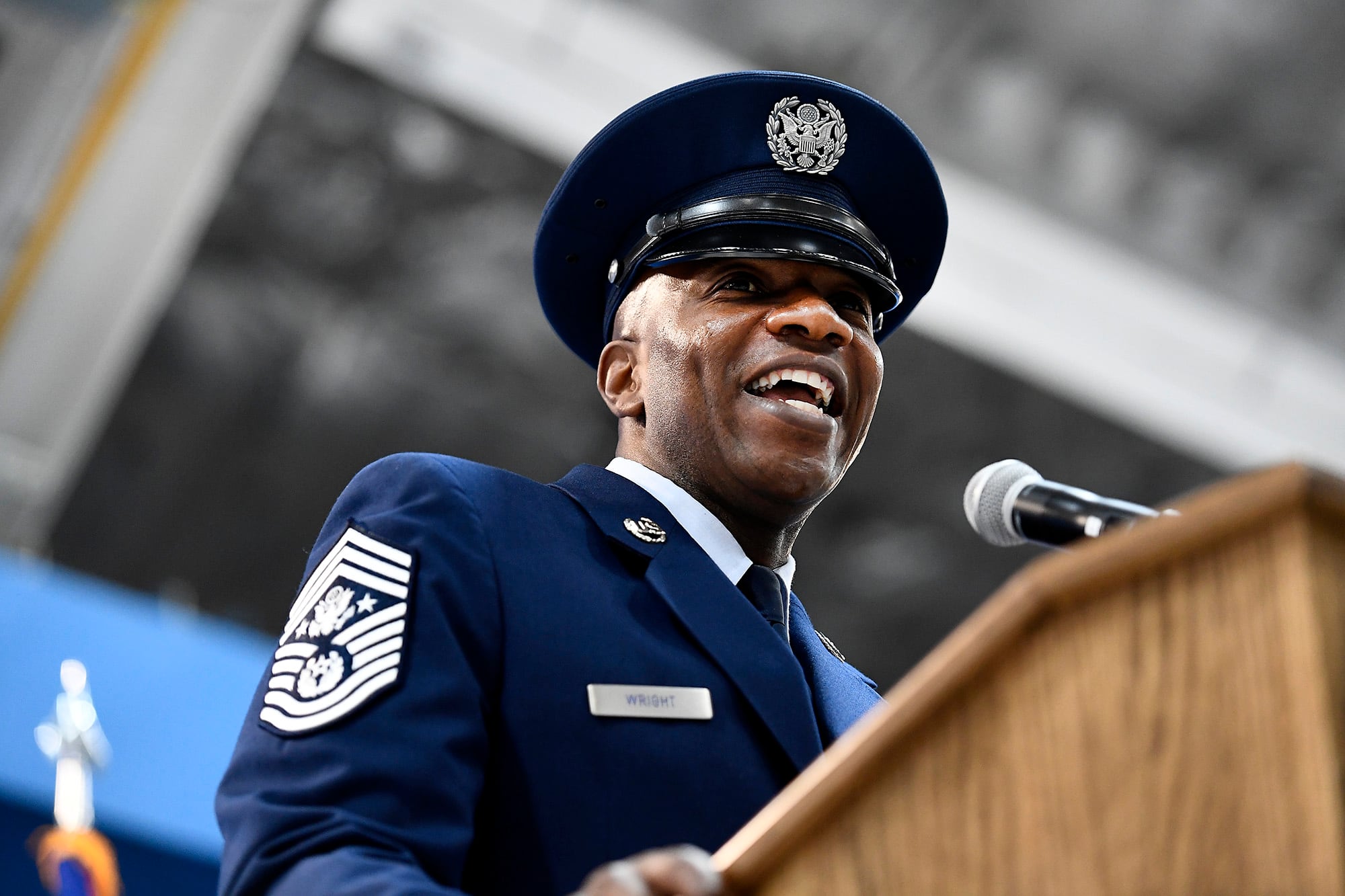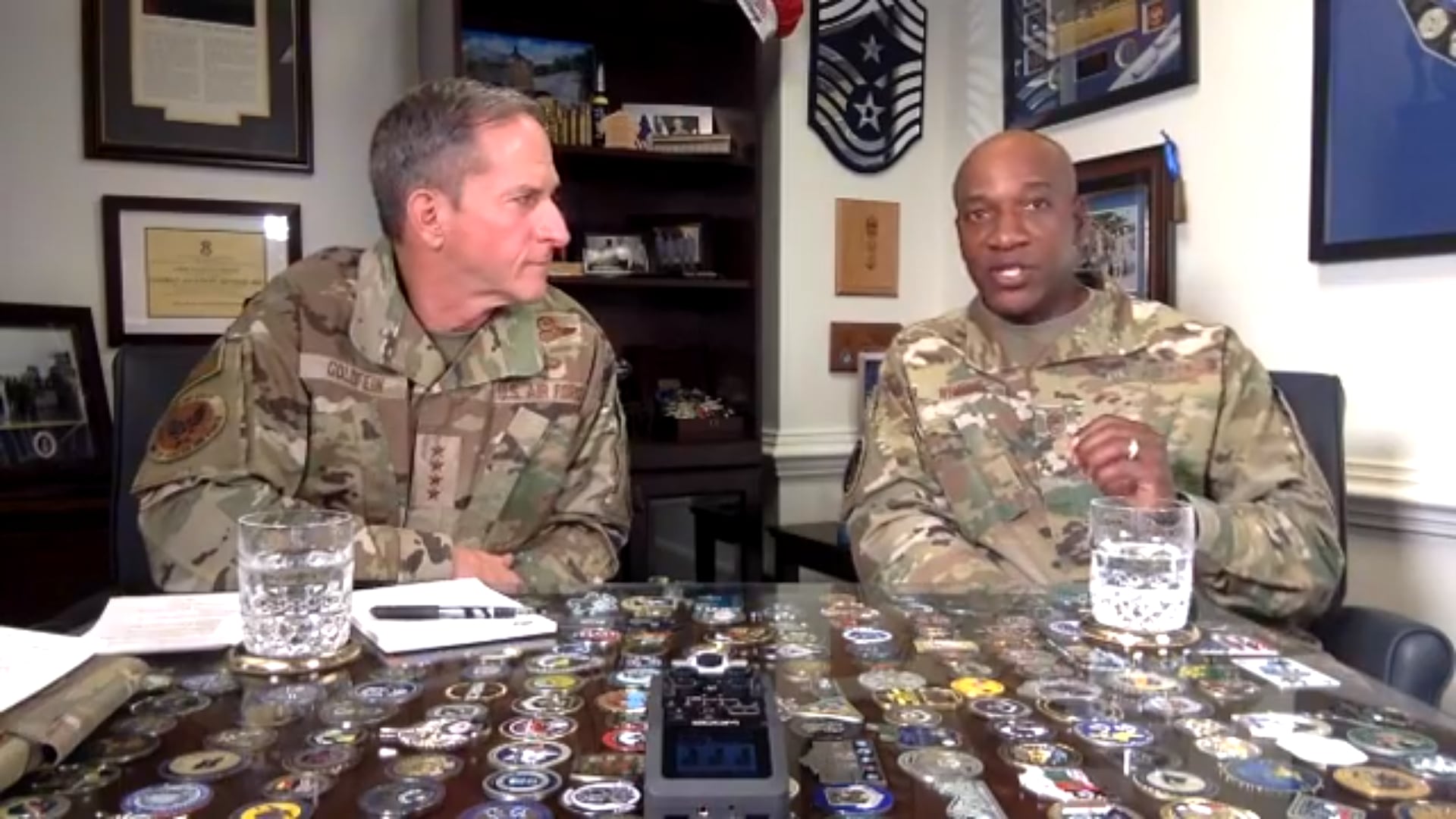Chief Master Sergeant of the Air Force Kaleth Wright woke up the morning of June 1 greatly troubled.
For days, Wright — the second Black man to serve as the Air Force’s top enlisted airman — had watched as the nation “boiled over” following George Floyd’s May 25 death during an arrest by the Minneapolis police. He spent the weekend thinking about how so many were tired of seeing Black men die in encounters with police, without the officers involved being held accountable for their deaths.
But the rapidly unfolding debate over racial injustice also hit Wright in a different way — one that stung. Coincidentally, two days after Floyd’s death, yet another report was released outlining racial disparities in how the Air Force’s own justice system unfairly affects airmen who are young Black men.
So that morning, moved by his distress at what was happening in the nation — as well as his knowledge that the Air Force has “our own demons” of racial injustice to exorcise, Wright sat down to pour his thoughts out into words. A little more than a half-hour later, he had drafted an emotionally raw post that began, in part, “Who am I? … I am George Floyd.”
“It got to a point where I just felt like, man, enough is enough,” Wright said in an interview Monday about his writing. “All the things I was thinking, and all the things I was feeling just came out on the paper.”
Wright’s post later that day quickly went viral, and drew praise from some for sparking a discussion of racial inequality in the military. But it also sparked criticism from others who felt it was divisive, or an inappropriately political statement. And it also prompted an avalanche of leaders across the military — starting with then-Air Force Chief of Staff Gen. Dave Goldfein, who retired last week — to weigh in on the delicate topic of racial justice.
But in Wright’s estimation, he had no choice but to speak out.
“I can respect people’s [differing] opinions,” Wright said. “I don’t have any issue with anyone disagreeing with what I wrote, what I said, how I feel. But to the point of, it’s a political issue, there is a political portion to it, but this is a race issue. This is a social issue. This is an Air Force issue, that our airmen — and all service members — were waiting for us as military leaders to talk about.”
“I felt like it [would have been] irresponsible of me to not say anything,” Wright continued.
RELATED

When Wright retires Friday after 31 years of service, he will leave as one of the most consequential chief master sergeants of the Air Force.
Not only did he lead the way on the diversity issue, but Wright also helped push the Air Force to do more on suicide prevention and improving airmen’s emotional resiliency.
Under Wright’s leadership as the 18th CMSAF, the Air Force adopted the “indefinite enlistment” system, in which airmen are automatically re-enlisted until they decide to separate.

He shepherded a series of changes to how enlisted airmen are tested and promoted, and how physical fitness tests are conducted. He worked to finally get airmen a long-desired overhaul of their utility uniform and adopt the Army’s Operational Camouflage Uniform.
As Wright looks back on his tenure as chief master sergeant of the Air Force, which began in February 2017, he is most proud of being a voice for airmen.
“I feel like we did a really good job of being connected to the force, from young airmen to senior officers, and making sure that we had a relatively good pulse of what was happening in the Air Force,” Wright said. “People feeling like they could reach out to us. I feel like we kind of changed the culture of the Air Force, and allowed a lot of people to trust that the Air Force has their best interest in mind.”
RELATED

His eagerness to address issues affecting airmen’s day-to-day lives — along with his easy-going manner — earned him a loyal following online, even inspiring fans to dub him “Enlisted Jesus.”
Wright said he was pleasantly surprised to see his style connect with people and his popularity take off — particularly since he didn’t think his personality and leadership style changed all the much over the years. When he was a younger airman in the days before social media, he didn’t remember paying much attention to what the chief master sergeant of the Air Force was doing.
“I was a bit surprised at the level of support … and the memes and patches,” Wright said. “It’s very humbling to have airmen and families see us in such a positive light.”
When asked about the Enlisted Jesus nickname, Wright chuckled. He said he was always wary of sharing or reposting those memes, because he knew some people might find them offensive — and it could be seen as narcissistic if he posted such a meme.
“But I think I understand what people meant when they first came up with it,” Wright said. “I’m always humbled. I chuckle every time I see a different meme, and I’m so appreciative that people liked what we were doing and saw us in that light.”

Wright is reluctant to look back on things left undone, but he wishes he had more time to see changes to the enlisted evaluation system take root. The Air Force in February 2019 dropped Weighted Airman Promotion System testing for promotion to senior noncommissioned officer ranks, and is considering doing the same for staff and technical sergeants, perhaps in 2021. Wright also has pushed to get enlisted airmen more frequent formal feedback in their evaluation process. This could include adding more coaching, and the use of apps and other technology.
These changes are crucial to making sure the Air Force chooses the right leaders, Wright said, but he intentionally took the rollout of these changes slowly, to make sure they were done right.
“I’m confident it will turn out great, and it’ll be exactly what we designed it to do,” Wright said. “But it certainly won’t get completed on my watch.”
In August 2019, Wright posted a video online raising alarms about the rising rates of suicide in the Air Force, and announcing, along with Goldfein, a one-day stand-down to focus on how to improve airmen’s resiliency.
Wright pointed to Air Force programs such as True North, which has put health care workers, psychologists and other workers directly into squadrons to help airmen with their mental resilience. The Air Force has also worked to reduce the stigma surrounding issues of mental health and talking about suicide, to make it so airmen are not reluctant to come forward and seek help when they’re having problems, he said.
“I feel like we have made a lot of progress in … dispelling the myth that if you raise your hand and say that you’re having problems, that you’ll lose your clearance, or lose your job or never get promoted again,” Wright said. “Because those stories are there. There are still people who either feel like, or know somebody who raised their hand and lost their job or lost their clearance. But for every one of those, there’s 20 stories of people who raised their hand or didn’t lose their clearance, or made chief, or became a general.”
Ultimately, Wright said, the Air Force will never be able to declare victory in the battles to achieve mental health resiliency and suicide prevention. The service will have to keep working on it and talking about this issue indefinitely.
After he retires, Wright will become CEO of the Air Force Aid Society, the service’s official charity, in October. He also plans to do some speaking engagements and leadership coaching.
Wright praised his successor, Chief Master Sgt. Joanne Bass, as a strong, collaborative and independent leader, who will be a “great wingman for Gen. [Charles ‘CQ’] Brown,” the newly sworn in Air Force chief of staff.
While Wright expects Bass to chart her own path as the 19th CMSAF, he does not foresee a significant change in course from his own tenure. Bass, who worked in the Pentagon as the Air Force’s chief of enlisted developmental education from 2016 to 2018, worked alongside Wright’s team on many of the initiatives of recent years.
Bass will be the first woman, and the first person of Asian-American descent, to serve as chief master sergeant of the Air Force. With Brown becoming the first Black service chief in U.S. military history and Air Force Secretary Barbara Barrett, the Air Force now has the most diverse leadership in the military’s history.
But when asked for his thoughts about the increasing diversity in Air Force leadership, Wright said he has “mixed feelings.” On the one hand, he said, it’s exciting to see Brown and Bass become the Air Force’s top officer and enlisted leader. And it feels good that he has become a role model, alongside them, to show minority airmen how much they can achieve.
On the other hand, he said, it feels long overdue — and the Air Force shouldn’t assume all its work on diversity is done.
“In 2020, we shouldn’t be that excited about having the first Black chief of staff, because there’s been several qualified Black senior officers … that could have been the chief of staff,” Wright said. “And there have been several females that could have been the chief master sergeant of the Air Force. … We can’t rest on our laurels. The key is to not allow Gen. Brown or Chief Bass’s selection to lull us into sleep, thinking that all is well in the world because we finally got a female chief or a Black chief of staff.”
After Wright’s June 1 post, the Air Force launched an inspector general review into potential racial inequality in its justice system and career opportunities, focusing first on Black airmen.
Wright said the Air Force still has a lot of work to do on diversity, but has already taken several steps. The service is working on hiring a chief diversity officer from outside the Air Force. The service has also received an overwhelming amount of feedback from airmen in the field from a survey that is part of the IG’s review.
After that study is done, Wright said, the Air Force needs to come up with a strategy to diversify and make sure all airmen — regardless of race, gender or sexual preference — have the same opportunities to succeed.

But it’s going to take time to fix, Wright said.
“We didn’t get here overnight, and we can’t fix it overnight,” Wright said.
The report on racial disparities in the Air Force’s justice system, released by the advocacy group Protect Our Defenders on May 27, “hit really close to home,” he said.
After drafting his George Floyd post June 1, Wright knew it would prove controversial. He walked into Goldfein’s office to tell him what he was planning, and said Goldfein was excited and supportive. The chief of staff read it and shared it with trusted colleagues before it was posted, and suggested next steps such as a Facebook town hall the two men did later that week.
Wright didn’t expect Goldfein to push back — but he had prepared himself for that possibility.
“I was ready, for the first time, to really fight him on” an issue, Wright said. “‘Hey man, it might not be popular, but I gotta publish this.’ But we never had to get to that point.”
Wright said most of the negative feedback he received about his post objected to him comparing himself to people such as Michael Brown.
But Wright felt it was important for him to speak in his own voice on this issue, and not ask public affairs to draft a “standard, canned statement” under his name.
“I knew it would be controversial,” Wright said. “I knew some people would take it the wrong way and make their own story out of it. But I also knew that some people would be inspired by it. As a leader, sometimes you have to take risk and not be afraid to say what needs to be said, not be afraid to let people know how you feel.”
At the same time, he said, he tried to make his post a “call to action” to increase understanding of one another, and not simply be critical of police or the Air Force.
As Wright departs the Air Force, he thanked his team, including his public affairs advisor, Senior Master Sgt. Harry Kibbe; senior executive advisor Chief Master Sgt. Kris Rogers; and first sergeant special duty manager Chief Master Sgt. Manny Pineiro.
But he also remembered his mentor and father figure, the tough-as-nails SNCO, Master Sgt. Joe Winbush. When Wright was a young airman at Pope Air Force Base in North Carolina, he was “a pretty crappy airman,” he said in a 2017 interview — getting into fights, talking back, and coming into work late.
But Winbush took the misguided airman under his wing and set him straight — inspiring him to clean up his act and join the base honor guard.
To this day, Wright sees Winbush and his wife once or twice a month. Winbush brags to his co-workers about how proud he is of Wright — and he still gives Wright honest advice and support.
“When the op-ed came out, he gave me a call and said, ‘Just hang in there, you did the right thing,‘” Wright said. “I still lean on him for advice and guidance, and he still tells me like it is, just like he did when I was a young airman.”
Stephen Losey is the air warfare reporter for Defense News. He previously covered leadership and personnel issues at Air Force Times, and the Pentagon, special operations and air warfare at Military.com. He has traveled to the Middle East to cover U.S. Air Force operations.









